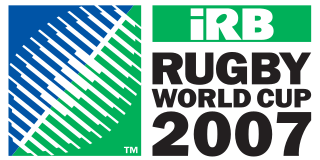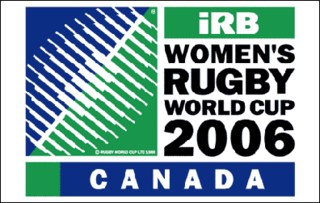
The Men's Rugby World Cup is a rugby union tournament contested every four years between the top international teams, the winners of which are recognised as the World champions of the sport.

The 1999 Rugby World Cup, was the fourth Rugby World Cup, the quadrennial international rugby union championship, the first World Cup to be held in the sport's professional era.

The 2007 Rugby World Cup was the sixth Rugby World Cup, a quadrennial international rugby union competition organised by the International Rugby Board. Twenty nations competed for the Webb Ellis Cup in the tournament, which was hosted by France from 7 September to 20 October. France won the hosting rights in 2003, beating a bid from England. The competition consisted of 48 matches over 44 days; 42 matches were played in 10 cities throughout France, as well as four in Cardiff, Wales, and two in Edinburgh, Scotland.
The Anglo-Welsh Cup, was a cross-border rugby union knock-out cup competition that featured the 12 Premiership Rugby clubs and the four Welsh regions. It was a created as a replacement for the RFU Knockout Cup, which featured only English clubs.

The 2011 Rugby World Cup, was the seventh Rugby World Cup, a quadrennial international rugby union competition inaugurated in 1987. The International Rugby Board (IRB) selected New Zealand as the host country in preference to Japan and South Africa at a meeting in Dublin on 17 November 2005. The tournament was won by New Zealand, who defeated France 8–7 in the final. The defending champions, South Africa, were eliminated by Australia 11–9 in the quarter-finals. The result marked the third time that the tournament was won by the country that hosted the event.
The 2005–06 Heineken Cup was the eleventh edition of the European Heineken Cup rugby union club tournament. 24 teams from 7 countries took part, with the opening game played on Friday October 21, 2005. Munster won the tournament, beating Biarritz in the final held at Millennium Stadium, Cardiff, on 20 May 2006.

The 2006 Women's Rugby World Cup took place in Edmonton, Alberta, Canada. The tournament began on 31 August and ended on 17 September 2006. The 2006 tournament was the third World Cup approved by the IRB, the previous two being held 2002 in Spain and in the Netherlands, in 1998. The Black Ferns of New Zealand won the 2006 World Cup, defeating England in the final, as they had in 2002. It was New Zealand's third successive title.
The 2005–06 World Sevens Series was the seventh edition of the global circuit for men's national rugby sevens teams, run by the International Rugby Board since 1999-2000. The series was won by Fiji in the last event of the competition, ending New Zealand's 6-year run as series champions. Fiji needed to finish in fifth place or higher at the London Sevens to ensure that they would win the series ahead of England, but won the tournament handily with 54–14 victory over Samoa in the final.

The 2002 Women's Rugby World Cup was the second World Cup fully sanctioned by the sports governing body the International Rugby Board (IRB). The tournament was held in Barcelona, Spain. The format was the same as the previous tournament and again 16 nations competed.

The 2010 Women's Rugby World Cup was the sixth edition of the Women's Rugby World Cup and was held in England. The International Rugby Board Executive Committee selected the host union following a recommendation from the Rugby World Cup Limited board after considering bids from the Rugby Football Union and the German Rugby Union – it had been England's third successive bid after being rejected in 2002 and 2006. The tournament was again being organised by the International Rugby Board (IRB) as opposed to the host union, and included five matches for all teams played on 20, 24, 28 August and 1 and 5 September. In May 2009 it was announced that the semi-final, 3rd place play off and final would take place at The Stoop and not Twickenham as had previously been suggested. Pool games were held at the Surrey Sports Park in Guildford.

The 2007–08 Heineken Cup was the 13th edition of the Heineken Cup, the annual rugby union European club competition for clubs from the top six nations in European rugby.

The 2014 Women's Rugby World Cup was the seventh edition of the Women's Rugby World Cup, and the sixth held in Europe. The World Cup Final took place on 17 August.
The 2011–12 Heineken Cup pool stage was the first stage of the 17th season of the Heineken Cup, Europe's top competition for rugby union clubs. It involved 24 teams competing for eight quarter-final berths, awarded to the winners of each of six pools plus the two top-ranked second-place teams. The nest three best runners-up were parachuted into the Amlin Challenge Cup.

The Premiership Rugby Sevens Series is a friendly Rugby Sevens competition for the twelve Premiership Rugby clubs that will play the following season. It was started in 2010, as an off-season competition, held during the months of July and August. Between 2014 and 2016 the competition included the four Welsh regions which compete in the Pro14.

2012 Sevens Grand Prix Series was the 11th round of the Sevens Grand Prix Series for rugby sevens organised by the FIRA – Association of European Rugby. The series was held in three phases hosted by France (Lyon), Russia (Moscow) and Denmark (Odense). The tournament was won by France, who defeated Portugal 21–12 in the final. England, winner of the first two phases of the tournament, were considered to be favourites but eliminated by France in the quarter-finals. England were the overall champions of the tournament.

The 2014 IRB Junior World Championship was the seventh annual international rugby union competition for Under 20 national teams. The event was organised in Auckland, New Zealand by rugby's governing body, World Rugby, then known as the International Rugby Board. A total of 12 nations took part in the tournament. England went into the tournament as defending champions, after winning the tournament for the first time in 2013. England went on to win the Championship for a second time in two years. While hosts New Zealand, the most successful team in the tournament, were looking to win the title for the first time since 2011.

The European Rugby Champions Cup is an annual rugby union tournament organised by European Professional Club Rugby (EPCR). It is the top-tier competition for clubs who compete in a predominantly European league. Clubs qualify for the Champions Cup via their final positions in their respective national/regional leagues or via winning the second-tier Challenge Cup; those that do not qualify are instead eligible to compete in the second-tier Challenge Cup.

The European Rugby Continental Shield was a rugby union competition, organised by European Professional Club Rugby, Rugby Europe and the Federazione Italiana Rugby, for entry into the European Rugby Challenge Cup.

The 2021 Rugby World Cup was the ninth staging of the women's Rugby World Cup, as organised by World Rugby. It was held from 8 October to 12 November 2022 in Auckland and Whangārei, New Zealand. It was originally scheduled to be held in 2021, but was postponed by one year due to the COVID-19 pandemic.
The 2021 Women's Six Nations Championship was the 20th series of the Women's Six Nations Championship, an annual women's rugby union competition between England, France, Ireland, Italy, Scotland and Wales. The 2021 tournament was given a change of format from its traditional eight week round-robin format to a four-week format consisting of two pools of three teams with a final, inspired by the format of the Autumn Nations Cup, which replaced the 2020 Autumn Internationals. The tournament was held from 3 to 24 April 2021.














